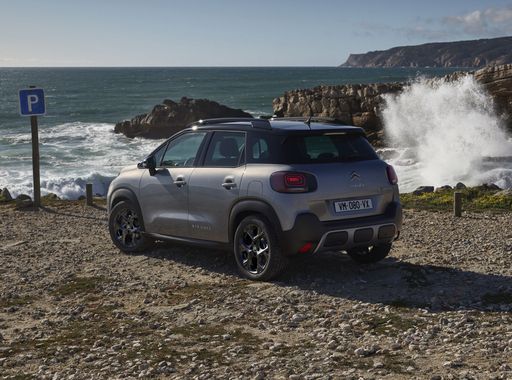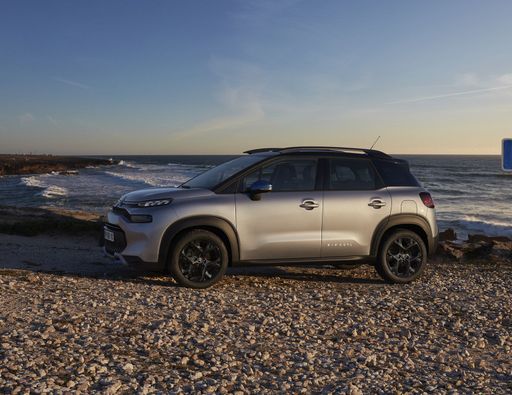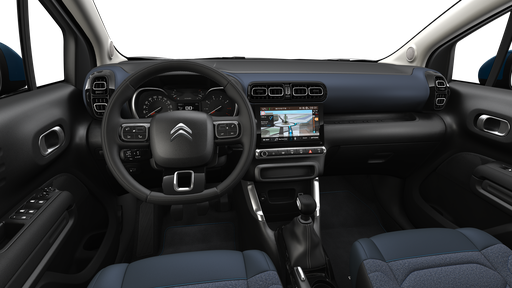Citroen C3 Aircross vs Hyundai Kona - Differences and prices compared
Costs and Efficiency:
Looking at overall running costs, both models reveal some interesting differences in everyday economy.
Citroen C3 Aircross has a convincingly advantage in terms of price – it starts at 16200 £, while the Hyundai Kona costs 23100 £. That’s a price difference of around 6866 £.
Fuel consumption also shows a difference: Hyundai Kona manages with 4.60 L and is therefore to a small extent more efficient than the Citroen C3 Aircross with 5.30 L. The difference is about 0.70 L per 100 km.
In terms of energy consumption, the advantage goes to the Hyundai Kona: with 14.60 kWh per 100 km, it’s a bit more efficient than the Citroen C3 Aircross with 16.30 kWh. That’s a difference of about 1.70 kWh.
As for range, the Hyundai Kona performs distinct better – achieving up to 514 km, about 114 km more than the Citroen C3 Aircross.
Engine and Performance:
Under the bonnet, it becomes clear which model is tuned for sportiness and which one takes the lead when you hit the accelerator.
When it comes to engine power, the Hyundai Kona has a clearly perceptible edge – offering 218 HP compared to 145 HP. That’s roughly 73 HP more horsepower.
In acceleration from 0 to 100 km/h, the Hyundai Kona is convincingly quicker – completing the sprint in 7.80 s, while the Citroen C3 Aircross takes 12.30 s. That’s about 4.50 s faster.
In terms of top speed, the Hyundai Kona performs slight better – reaching 210 km/h, while the Citroen C3 Aircross tops out at 201 km/h. The difference is around 9 km/h.
There’s also a difference in torque: Hyundai Kona pulls slightly stronger with 265 Nm compared to 230 Nm. That’s about 35 Nm difference.
Space and Everyday Use:
Cabin size, boot volume and payload all play a role in everyday practicality. Here, comfort and flexibility make the difference.
Seats: offers more seating capacity – vs .
In curb weight, Citroen C3 Aircross is minimal lighter – 1312 kg compared to 1370 kg. The difference is around 58 kg.
In terms of boot space, the Hyundai Kona offers slight more room – 466 L compared to 460 L. That’s a difference of about 6 L.
In maximum load capacity, the Citroen C3 Aircross performs a bit better – up to 1600 L, which is about 300 L more than the Hyundai Kona.
When it comes to payload, Hyundai Kona minimal takes the win – 490 kg compared to 462 kg. That’s a difference of about 28 kg.
Who comes out on top?
Overall, the Hyundai Kona shows itself to be outperforms in nearly all aspects and secures the title of DriveDuel Champion.
It convinces with the more balanced overall package and proves to be the more versatile choice for everyday use.
 @ Hyundai Motor Company
@ Hyundai Motor Company
Hyundai Kona
Costs and Consumption
View detailed analysis
Engine and Performance
View detailed analysis
Dimensions and Body
View detailed analysis
Citroen C3 Aircross
The Citroën C3 Aircross is a cheeky compact SUV that trades bland conformity for playful French character and clever practicality, ideal if you want a car with personality. It soaks up city life with a comfortable ride, inventive cabin tricks and a look that turns heads without asking for attention.
details @ Citroën / Stellantis Media
@ Citroën / Stellantis Media
 @ Citroën / Stellantis Media
@ Citroën / Stellantis Media
 @ Citroën / Stellantis Media
@ Citroën / Stellantis Media
 @ Citroën / Stellantis Media
@ Citroën / Stellantis Media
Hyundai Kona
The Hyundai Kona wears its personality on the outside with bold styling and sprightly handling that turns city driving into something a little more fun than a commute. It blends practical space, modern tech and sensible running costs into a compact, stylish package — a smart pick if you want flair without paying luxury prices.
details @ Hyundai Motor Company
@ Hyundai Motor Company
 @ Hyundai Motor Company
@ Hyundai Motor Company
 @ Hyundai Motor Company
@ Hyundai Motor Company
 @ Hyundai Motor Company
@ Hyundai Motor Company
 @ Citroën / Stellantis Media
@ Citroën / Stellantis Media
|
 @ Hyundai Motor Company
@ Hyundai Motor Company
|
|
|
|
Costs and Consumption |
|
|---|---|
|
Price
16200 - 28200 £
|
Price
23100 - 41600 £
|
|
Consumption L/100km
5.3 - 5.9 L
|
Consumption L/100km
4.6 - 7 L
|
|
Consumption kWh/100km
16.3 - 18.3 kWh
|
Consumption kWh/100km
14.6 - 16.8 kWh
|
|
Electric Range
303 - 400 km
|
Electric Range
377 - 514 km
|
|
Battery Capacity
-
|
Battery Capacity
1.3 - 65.4 kWh
|
|
co2
0 - 134 g/km
|
co2
0 - 163 g/km
|
|
Fuel tank capacity
44 L
|
Fuel tank capacity
38 - 47 L
|
Dimensions and Body |
|
|---|---|
|
Body Type
SUV
|
Body Type
SUV
|
|
Seats
5
|
Seats
5
|
|
Doors
5
|
Doors
5
|
|
Curb weight
1312 - 1608 kg
|
Curb weight
1370 - 1773 kg
|
|
Trunk capacity
460 L
|
Trunk capacity
466 L
|
|
Length
4395 mm
|
Length
4350 - 4385 mm
|
|
Width
1795 mm
|
Width
1825 mm
|
|
Height
1640 - 1660 mm
|
Height
1580 - 1585 mm
|
|
Max trunk capacity
1600 L
|
Max trunk capacity
1300 L
|
|
Payload
407 - 462 kg
|
Payload
420 - 490 kg
|
Engine and Performance |
|
|---|---|
|
Engine Type
Petrol, Electric, Petrol MHEV
|
Engine Type
Electric, Petrol, Full Hybrid
|
|
Transmission
Manuel, Automatic
|
Transmission
Automatic, Manuel
|
|
Transmission Detail
Manual Gearbox, Reduction Gearbox, Dual-Clutch Automatic
|
Transmission Detail
Reduction Gearbox, Manual Gearbox, Dual-Clutch Automatic
|
|
Drive Type
Front-Wheel Drive
|
Drive Type
Front-Wheel Drive, All-Wheel Drive
|
|
Power HP
101 - 145 HP
|
Power HP
115 - 218 HP
|
|
Acceleration 0-100km/h
12.3 - 13 s
|
Acceleration 0-100km/h
7.8 - 11.9 s
|
|
Max Speed
143 - 201 km/h
|
Max Speed
162 - 210 km/h
|
|
Torque
125 - 230 Nm
|
Torque
200 - 265 Nm
|
|
Number of Cylinders
3
|
Number of Cylinders
3 - 4
|
|
Power kW
74 - 107 kW
|
Power kW
85 - 160 kW
|
|
Engine capacity
1199 cm3
|
Engine capacity
998 - 1598 cm3
|
General |
|
|---|---|
|
Model Year
2024 - 2025
|
Model Year
2024 - 2025
|
|
CO2 Efficiency Class
D, A
|
CO2 Efficiency Class
A, D, C, E, F
|
|
Brand
Citroen
|
Brand
Hyundai
|
What drivetrain options does the Citroen C3 Aircross have?
The Citroen C3 Aircross is offered with Front-Wheel Drive.
The prices and data displayed are estimates based on German list prices and may vary by country. This information is not legally binding.
